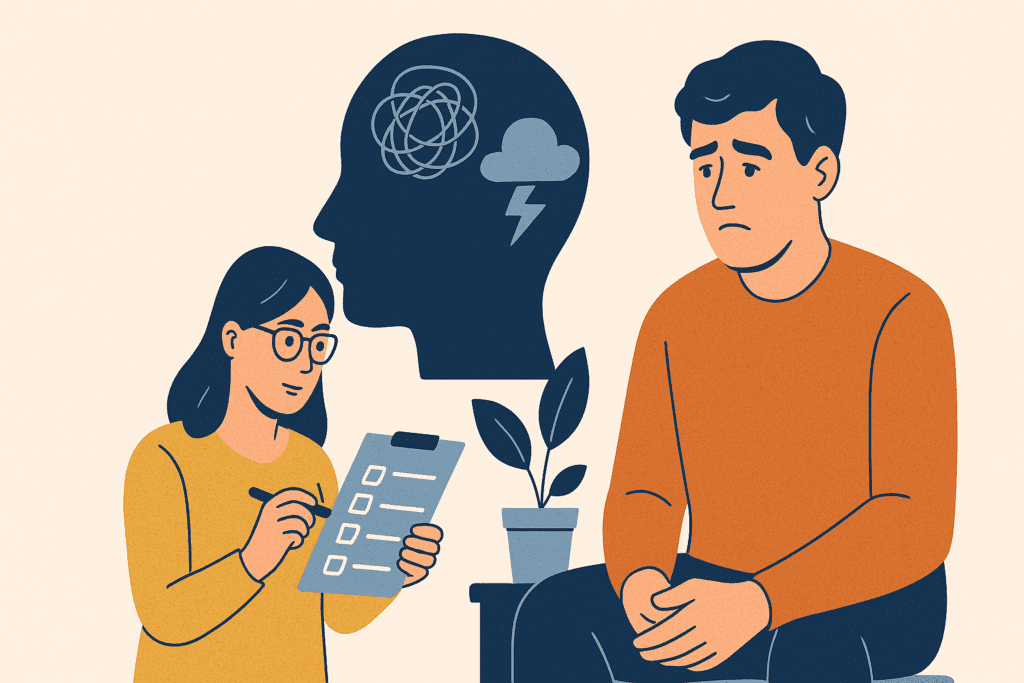Understanding the nuances of your mental health is a lifelong journey, and it often begins with asking the right questions. One of the most effective ways to gain clarity is through a cognitive behavioral therapy test. Whether administered by a licensed therapist or completed through a structured online format, a CBT therapy test can act as a diagnostic compass, pointing toward underlying cognitive distortions, maladaptive behaviors, and emotional regulation challenges. For many individuals, this form of testing offers the first clear insight into how their thoughts, feelings, and behaviors are interconnected—and where intervention might bring the greatest relief.
You may also like: How Does CBT Work to Improve Relationships and Communication? Science-Backed Techniques for Getting Along with Others
Although the term “cognitive behavioral therapy test” may sound clinical or even intimidating, it serves a fundamentally human purpose: to help people better understand the patterns that may be holding them back. As a tool grounded in decades of empirical psychological research, a CBT therapy test doesn’t just categorize or label. Instead, it provides a roadmap for therapeutic change, offering individuals the opportunity to recognize, challenge, and reshape unhelpful thinking styles. As we explore what this kind of testing entails, its diagnostic utility, and the signs that it might be time to consider one, a clearer picture emerges of its potential to transform how we approach emotional wellness.
The Foundations of Cognitive Behavioral Therapy
To fully grasp what a cognitive behavioral therapy test can reveal, it helps to first understand the foundation of CBT itself. Developed by Aaron T. Beck in the 1960s, CBT is a structured, time-limited, and goal-oriented psychotherapy model that focuses on identifying and modifying dysfunctional thought patterns. Unlike psychoanalysis, which delves into unconscious motivations and early childhood experiences, CBT places emphasis on present thoughts and behaviors. It aims to equip individuals with practical strategies to navigate emotional distress, anxiety, depression, and other common mental health concerns.
CBT operates on a central premise: the way we think significantly influences the way we feel and act. For example, a person who automatically assumes failure in every situation may be more prone to feelings of hopelessness and inactivity. Over time, such negative core beliefs can perpetuate a self-defeating cycle. A cognitive behavioral therapy test seeks to pinpoint these thought distortions, such as catastrophizing, black-and-white thinking, or personalization, so they can be consciously addressed in therapy.
Moreover, CBT encourages collaboration between the therapist and the client. The goal is not just symptom reduction but long-term change through cognitive restructuring and behavioral experimentation. In this context, a CBT therapy test becomes a diagnostic springboard that informs the collaborative process, shaping the course of therapeutic sessions in a way that is both targeted and empirically supported.
What a CBT Therapy Test Measures
While cognitive behavioral therapy tests come in various formats, they generally assess a range of psychological domains that influence mental health. These include cognitive distortions, emotional regulation, behavioral patterns, and core belief systems. A well-constructed test may incorporate standardized scales, such as the Beck Depression Inventory or the Automatic Thoughts Questionnaire, to objectively gauge levels of distress, thought intrusiveness, and behavioral avoidance.
One of the most revealing aspects of a CBT therapy test is how it uncovers thought patterns that might otherwise remain unexamined. Individuals often internalize their mental scripts over time, making it difficult to identify which beliefs are healthy and which are undermining well-being. For instance, someone experiencing chronic anxiety may not realize they are engaging in habitual catastrophizing until a cognitive behavioral therapy test highlights this tendency. The test thus acts as a mirror, reflecting back cognitive habits that have become so routine they feel normal.
Another valuable dimension is the test’s ability to detect patterns related to emotional regulation. Emotional dysregulation—difficulty in managing emotions like anger, sadness, or fear—often accompanies a range of mental health conditions. A CBT therapy test may assess how frequently a person engages in emotional suppression, rumination, or impulsive behavior as a response to emotional discomfort. Recognizing these patterns is critical, as they directly influence the success of therapeutic interventions designed to improve emotional balance.
In addition, many cognitive behavioral therapy tests probe for behavioral avoidance and safety behaviors, which are subtle ways people try to shield themselves from discomfort. Avoidance may seem protective, but over time it limits a person’s life and reinforces the very fears they hope to avoid. Understanding these behaviors through structured assessment gives therapists and clients a shared language and starting point for exposure-based interventions and behavioral activation strategies.
When to Consider Taking a Cognitive Behavioral Therapy Test
Deciding when to take a CBT therapy test can be deeply personal, but there are several signs that suggest it might be beneficial. If you find yourself stuck in repetitive thought loops, struggling with chronic anxiety, depression, or self-esteem issues, or experiencing difficulty in relationships due to overthinking or misinterpretation, a cognitive behavioral therapy test may offer much-needed clarity. The test doesn’t just indicate what might be “wrong”; it reveals how your internal processing is shaping your outer experiences.
Sometimes, the need for a CBT therapy test emerges after a significant life transition. A move, breakup, job change, or loss can disrupt psychological equilibrium and surface latent issues that had previously gone unnoticed. In such cases, the test provides a structured format to identify newly arising cognitive and behavioral patterns that may not yet be fully conscious. Similarly, individuals recovering from trauma often benefit from cognitive behavioral therapy tests that help pinpoint maladaptive coping mechanisms formed in response to their experiences.
It’s also worth considering a CBT therapy test if traditional therapeutic approaches have yielded limited progress. Some individuals undergo years of talk therapy without identifying the core beliefs or thought errors driving their distress. A CBT-based assessment, with its emphasis on structure and clarity, can introduce a new therapeutic lens that revitalizes treatment. For clinicians as well, administering a cognitive behavioral therapy test can streamline case conceptualization and allow for more tailored interventions that align with client-specific thought and behavior patterns.
Furthermore, the decision to take a CBT therapy test doesn’t always require the presence of overt psychological symptoms. Some individuals use these assessments proactively to enhance self-awareness and prevent the escalation of stress-related issues. In high-functioning individuals, subtle cognitive distortions can still cause disruptions in focus, productivity, and interpersonal communication. Recognizing these early through testing can help prevent burnout or emotional disengagement before it becomes a larger concern.

How Results Inform the Therapeutic Process
The real power of a cognitive behavioral therapy test lies not just in diagnosis but in its practical application. Once patterns are identified, therapy can move from general discussion to targeted intervention. For example, a test that reveals frequent all-or-nothing thinking might lead to specific cognitive restructuring exercises that challenge binary thought processes. Similarly, a finding of chronic rumination might prompt mindfulness-based strategies or journaling exercises designed to break the cycle of obsessive thinking.
These results also help therapists prioritize treatment goals. Rather than casting a wide net, clinicians can focus on the most impactful cognitive distortions or behaviors, using evidence-based techniques that address the client’s specific needs. This makes therapy more efficient and measurable, providing both therapist and client with benchmarks for progress. In cases where multiple patterns emerge, such as simultaneous catastrophizing and avoidance behaviors, therapists can layer interventions in a phased manner that builds foundational cognitive flexibility before advancing to behavioral exposures.
The collaborative nature of CBT ensures that clients are not passive recipients of this information but active participants in making meaning of their test results. Therapists often review results in-session, using them to engage clients in reflective dialogue about their thought processes. This co-exploration fosters empowerment, encouraging clients to view their mental health not as a static label but as a dynamic system that can be understood and modified. For many, this is the moment where hope and agency return, catalyzed by the clarity that a CBT therapy test provides.
Importantly, these tests also allow for ongoing measurement of therapeutic effectiveness. Re-administering the same cognitive behavioral therapy test at regular intervals can show tangible shifts in thought patterns, emotional regulation, and behavior. This not only validates the client’s hard work but also helps fine-tune the treatment approach over time, ensuring that therapy remains responsive and relevant.
Limitations and Ethical Considerations
While CBT therapy tests offer significant insight, it’s essential to recognize their limitations. These assessments are tools—not definitive diagnoses. They function best within the context of a broader therapeutic relationship, guided by trained mental health professionals who can interpret results within a client’s unique psychological landscape. Misinterpreting or over-relying on test results can lead to overly rigid treatment plans or misplaced self-diagnosis, particularly when tests are taken online without professional oversight.
Furthermore, not all cognitive behavioral therapy tests are created equal. The psychometric validity of an assessment—its reliability, accuracy, and standardization—matters greatly. Tests found on unverified websites may lack the scientific rigor needed to yield meaningful insights. It is always advisable to seek testing through licensed therapists or platforms that utilize empirically supported instruments. Ethical mental health practice requires that testing is conducted with informed consent, confidentiality, and a clear plan for how results will be used to support well-being.
Another ethical concern is accessibility. While CBT has become widely respected in clinical psychology, access to testing and therapy can still be limited by geography, financial constraints, or social stigma. Expanding access to cognitive behavioral therapy tests through community mental health programs, workplace wellness initiatives, and telehealth platforms can help bridge this gap. Advocacy for mental health equity must include the tools of CBT, which have shown remarkable efficacy across diverse populations and diagnoses.
Finally, there is a risk of reductionism—the tendency to oversimplify complex psychological experiences into a checklist of symptoms or thought distortions. While CBT excels in its structured approach, it must be balanced with the understanding that human suffering is nuanced. A CBT therapy test should always be part of a broader, integrative approach to care that honors emotional complexity, personal history, and cultural context.
Empowering Mental Health Through Insight and Action
Taking a cognitive behavioral therapy test can be a pivotal moment in your mental health journey. It provides a structured lens through which to examine the beliefs, behaviors, and emotional responses that shape your everyday experiences. For many, it is the first time they encounter a framework that not only explains their internal struggles but also offers concrete steps for change. By identifying cognitive distortions, uncovering emotional regulation challenges, and mapping out behavioral avoidance patterns, a CBT therapy test helps transform confusion into clarity and inertia into action.
The value of this insight lies not just in what it reveals, but in what it enables. Armed with the knowledge provided by a cognitive behavioral therapy test, individuals are better equipped to engage in meaningful therapeutic work. They are empowered to replace self-criticism with self-compassion, reframe harmful beliefs, and experiment with new, more adaptive behaviors. This shift often leads to enhanced emotional resilience, improved relationships, and a renewed sense of purpose.
Ultimately, mental health is not a destination but a dynamic process of self-understanding and growth. A CBT therapy test is one of many tools available on this journey, but it is uniquely positioned to catalyze deep, lasting change. Whether you’re struggling with anxiety, navigating life transitions, or simply seeking to understand yourself more fully, taking the time to engage with this form of assessment can open doors to healing that might otherwise remain closed. By making sense of the mental habits that shape your world, you can begin to reshape that world in ways that foster well-being, connection, and meaningful living.

Frequently Asked Questions (FAQ): Cognitive Behavioral Therapy Tests
1. Can a cognitive behavioral therapy test help even if I don’t have a diagnosed mental illness?
Absolutely. One of the most overlooked benefits of a cognitive behavioral therapy test is its usefulness for individuals who are functioning well but want to deepen their emotional intelligence and resilience. Many professionals, students, and high-performing individuals use these tests proactively to identify hidden cognitive distortions, strengthen self-awareness, and improve decision-making under stress. By revealing subtle but impactful thought patterns, a CBT therapy test can help optimize productivity, interpersonal communication, and emotional regulation. Even in the absence of clinical symptoms, the insights from a cognitive behavioral therapy test can contribute meaningfully to personal development and mental clarity.
2. How does a cognitive behavioural therapy test differ when taken online versus with a therapist?
While online formats of a cognitive behavioural therapy test offer convenience and accessibility, working with a therapist provides depth, interpretation, and context that digital tools often lack. A therapist can tailor the discussion around test results to align with your personal history, environment, and goals, making the test far more dynamic. Online versions can still be helpful for self-reflection, but they often lack adaptive algorithms or clinical calibration that ensure reliable outcomes. Additionally, therapists use CBT therapy tests as part of an evolving process, integrating new findings over time rather than treating the test as a static assessment. For more accurate results and effective follow-up, combining digital assessments with therapeutic dialogue is often the most beneficial approach.
3. Are there different types of CBT therapy tests, and how do I know which one is right for me?
Yes, there are various types of CBT therapy tests, each targeting specific areas like anxiety, depression, obsessive thinking, or behavioral avoidance. Some tools, such as the Dysfunctional Attitude Scale, explore rigid belief systems, while others like the Cognitive Distortions Scale identify habitual thinking errors. If you’re unsure where to begin, consulting a licensed therapist can help match the right cognitive behavioral therapy test to your unique emotional challenges or goals. For self-guided users, starting with broad-spectrum assessments can provide a panoramic view of cognitive tendencies before narrowing down to issue-specific tools. Choosing the right test depends not only on symptoms but also on your therapeutic objectives and the level of guidance you prefer.
4. How can a cognitive behavioural therapy test support long-term mental health maintenance?
A cognitive behavioural therapy test isn’t just a one-time evaluation—it can be part of an ongoing strategy for mental wellness. By tracking how your cognitive patterns evolve over time, these assessments offer measurable insights into progress and areas for further improvement. For those managing chronic conditions like generalized anxiety or persistent depressive disorder, periodic CBT therapy tests can detect early warning signs of relapse. They also help refine coping strategies, ensuring that interventions remain relevant and effective as life circumstances change. Integrating these tests into a broader wellness plan enhances accountability and empowers individuals to remain active participants in their own mental health journey.
5. Are the results of a CBT therapy test valid across different cultures and identities?
This is a critical and evolving area in psychological assessment. While cognitive behavioral therapy tests are grounded in well-researched psychological frameworks, some instruments may reflect cultural assumptions that don’t universally apply. The way cognitive distortions manifest can vary based on cultural norms, family dynamics, and socio-political context. When interpreting a cognitive behavioural therapy test, it is essential to consider cultural background, identity, and lived experience to avoid mislabeling adaptive behaviors as dysfunctional. Many contemporary CBT practitioners now adapt assessments to be more culturally sensitive, and emerging research is driving the development of more inclusive tools.
6. Can taking a CBT therapy test impact the effectiveness of therapy itself?
Yes, and often positively so. When therapy begins with the foundation of a cognitive behavioral therapy test, both client and therapist have a shared map to navigate treatment. It accelerates the therapeutic process by spotlighting key issues from the outset, reducing the time typically needed for exploratory sessions. Moreover, it sets a precedent for structured collaboration, allowing therapy to become goal-oriented and measurable. Clients also tend to feel more engaged when they see tangible representations of their thought patterns and progress. The CBT therapy test thus acts not just as a diagnostic tool, but as an engagement catalyst that enhances therapeutic alliance and outcomes.
7. What role does emotional granularity play in interpreting CBT therapy test results?
Emotional granularity—the ability to precisely identify and label one’s emotions—significantly enhances the interpretive value of a cognitive behavioral therapy test. Many distortions identified by these assessments stem from oversimplified emotional interpretations, such as mistaking irritation for anger or nervousness for fear. Developing emotional granularity allows clients to refine their understanding of how specific emotions link to specific thoughts and behaviors. As a result, interventions derived from a CBT therapy test can become more targeted and effective. Therapists may encourage emotional journaling or use mood-tracking tools alongside CBT assessments to build this important skill.
8. How do life stages influence the relevance of a cognitive behavioral therapy test?
Different life stages introduce new cognitive demands, stressors, and identity questions, all of which can be illuminated through a CBT therapy test. For adolescents, such tests may reveal black-and-white thinking patterns tied to emerging self-concept. For young adults, they often uncover perfectionism or fear of failure rooted in transitional life pressures. In midlife, assessments might bring to light core beliefs shaped by burnout or caregiving roles. And for older adults, a cognitive behavioural therapy test can help address issues like isolation, loss, or shifting identity post-retirement. Each stage benefits from a nuanced approach that interprets results within the context of developmental challenges and transitions.
9. Can organizations or workplaces benefit from offering cognitive behavioural therapy tests?
Absolutely. In workplace settings, offering access to a cognitive behavioural therapy test as part of wellness initiatives can proactively address stress, burnout, and productivity issues. These tests can help employees recognize unhelpful thinking patterns that influence performance, collaboration, and job satisfaction. When implemented thoughtfully and confidentially, CBT therapy tests contribute to healthier workplace cultures by fostering psychological safety and emotional self-awareness. Organizations can also use aggregated, anonymized data to tailor employee support programs more effectively. As mental health becomes a cornerstone of sustainable corporate culture, cognitive behavioral therapy tests are emerging as practical tools for both individuals and organizations.
10. What innovations are emerging in the field of CBT assessment and testing?
The future of cognitive behavioral therapy testing is becoming increasingly tech-integrated and personalized. Innovations include AI-powered adaptive assessments that adjust in real-time based on user responses, improving accuracy and engagement. Some platforms now incorporate biometric data, such as heart rate variability, to correlate cognitive patterns with physiological stress markers. Mobile apps are also making CBT therapy tests more accessible, allowing users to track changes in cognition and mood throughout the day. Additionally, virtual reality environments are being explored as immersive tools to simulate situations that trigger cognitive distortions, offering experiential insight during assessment. These innovations promise to enhance the precision, inclusivity, and real-world applicability of the traditional cognitive behavioural therapy test.

Reframing Your Mental Wellness: Why a CBT Therapy Test May Be the Insightful Shift You Need
In a world where mental health challenges often remain hidden beneath the surface, a cognitive behavioral therapy test offers more than just a diagnostic snapshot—it offers a roadmap to resilience, clarity, and healing. By uncovering the core patterns that shape how you think, feel, and behave, a CBT therapy test brings structure to the often chaotic landscape of emotional experience. Whether you’re dealing with persistent anxiety, unshakable self-doubt, or the lingering effects of past trauma, understanding these patterns is the first step toward meaningful change.
The true power of a cognitive behavioral therapy test lies not in labeling you, but in empowering you. It translates abstract struggles into actionable insights, revealing the subtle distortions and behavioral habits that may be fueling emotional distress. When used under the guidance of a qualified therapist or within a structured digital program rooted in clinical evidence, these assessments can be transformative—offering not just awareness, but direction. For many, this moment of clarity marks the beginning of a healthier relationship with oneself and others.
If you’ve found yourself asking why certain emotional patterns keep resurfacing, or why you feel stuck in repetitive cycles despite your best efforts, it may be time to consider a CBT therapy test. Far from being a passive evaluation, it invites you into a collaborative, empowering process of self-discovery and growth. In doing so, it affirms that mental health is not about perfection, but about progress—and that with the right tools, change is not only possible, but sustainable.
Let the insights from a cognitive behavioral therapy test guide you toward a more intentional and fulfilling path. The journey to mental wellness doesn’t begin with fixing what’s broken; it begins with understanding what’s been misunderstood—and from there, building something better.
mental health assessment tools, psychological self-evaluation, identifying thought patterns, behavioral health screening, signs of cognitive distortion, therapy readiness indicators, emotional self-awareness, mental wellness strategies, anxiety and thinking traps, depression and negative thoughts, therapy outcome measurement, self-guided therapy tools, emotional regulation techniques, structured psychotherapy tools, identifying limiting beliefs, mental health check-in, therapy decision-making, cognitive restructuring tools, early signs of emotional stress, understanding mental habits
Further Reading:
In brief: Cognitive behavioral therapy (CBT)
Cognitive Behavioral Therapy (CBT): What It Is & Techniques
Cognitive Behavioral Therapy: Techniques, Types, and Uses
Disclaimer
The information contained in this article is provided for general informational purposes only and is not intended to serve as medical, legal, or professional advice. While Health11News strives to present accurate, up-to-date, and reliable content, no warranty or guarantee, expressed or implied, is made regarding the completeness, accuracy, or adequacy of the information provided. Readers are strongly advised to seek the guidance of a qualified healthcare provider or other relevant professionals before acting on any information contained in this article. Health11News, its authors, editors, and contributors expressly disclaim any liability for any damages, losses, or consequences arising directly or indirectly from the use, interpretation, or reliance on any information presented herein. The views and opinions expressed in this article are those of the author(s) and do not necessarily reflect the official policies or positions of Health11News.


